List of governors of Georgia
The governor of Georgia is the head of the executive branch of Georgia's state government and the commander-in-chief of the state's military forces.
| Governor of Georgia | |
|---|---|
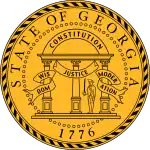 Great Seal of the State of Georgia | |
| Residence | Georgia Governor's Mansion |
| Term length | Four years, renewable once |
| Inaugural holder | Archibald Bulloch |
| Formation | July 12, 1775 |
| Salary | $139,339 (2013)[1] |
| Website | No URL found. Please specify a URL here or add one to Wikidata. |
The current governor is Republican Brian Kemp, who took office on January 14, 2019.
List of Governors
| No.[lower-alpha 2] | Governor | Term in office | Party | Election | Lt. Governor[lower-alpha 3] | |||
|---|---|---|---|---|---|---|---|---|
| 16 |  |
Archibald Bulloch | 1776 – 1777 (died in office) |
None | —[lower-alpha 4] | Office did not exist | ||
| 17 |  |
Button Gwinnett | 1777 – 1778 |
None | —[lower-alpha 5] | |||
| 18 |  |
John A. Treutlen | 1778 – 1779 |
None | — | |||
| 19 | John Houstoun | 1779 – 1780[lower-alpha 6] |
None | — | ||||
| — | Vacant | 1780 – August 6, 1781 |
— | Government in chaos after fall of Savannah[lower-alpha 7] | ||||
| 11 |  |
John Wereat | August 6, 1782 – November 1783[lower-alpha 7] |
None | — | |||
| 12 | .jpg.webp) |
George Walton | November 1783[lower-alpha 7] – January 4, 1785 |
None | — | |||
| 13 | Richard Howly | January 4, 1780 – February 5, 1780 (resigned)[lower-alpha 8] |
None | —[lower-alpha 9] | ||||
| 14 |  |
Stephen Heard | February 18, 1780 – August 18, 1781 |
None | —[lower-alpha 9][lower-alpha 10] | |||
| 15 | Nathan Brownson | August 18, 1781 – January 3, 1782 (term limited) |
None | 1781 | ||||
| 16 | John Martin | January 1, 1782 – December 31, 1782 (term limited) |
None | 1782 | ||||
| 17 |  |
Lyman Hall | January 8, 1783 – December 9, 1783 (term limited) |
None | 1783 | |||
| 10 | John Houstoun | January 9, 1784 – January 6, 1785 (term limited) |
None | 1784 | ||||
| 18 | Samuel Elbert | January 6, 1785 – January 9, 1786 (term limited) |
None | 1785 | ||||
| 19 | Edward Telfair | January 9, 1786 – January 9, 1787 (term limited) |
None | 1786 | ||||
| 20 | George Mathews | January 9, 1787 – January 26, 1788 (term limited) |
None | 1787 | ||||
| 21 | George Handley | January 26, 1788 – January 7, 1789 (term limited) |
None | 1788[lower-alpha 11] | ||||
| 12 |  |
George Walton | January 7, 1789 – November 9, 1789 (term limited) |
Democratic- Republican |
Jan. 1789 | |||
| 19 | Edward Telfair | November 9, 1789 – November 7, 1793 (lost election) |
Democratic- Republican |
Nov. 1789[lower-alpha 12] | ||||
| 1791 | ||||||||
| 20 | George Mathews | November 7, 1793 – January 15, 1796 (not candidate for election) |
Democratic- Republican |
1793 | ||||
| 22 |  |
Jared Irwin | January 15, 1796 – January 12, 1798 (not candidate for election) |
Democratic- Republican |
1795 | |||
| 23 |  |
James Jackson | January 12, 1798 – March 3, 1801 (resigned)[lower-alpha 13] |
Democratic- Republican |
1797 | |||
| 1799 | ||||||||
| 24 | David Emanuel | March 3, 1801 – November 7, 1801 (not candidate for election) |
Democratic- Republican |
Succeeded from President of the Senate | ||||
| 25 | Josiah Tattnall | November 7, 1801 – November 4, 1802 (resigned)[lower-alpha 14] |
Democratic- Republican |
1801 | ||||
| 26 |  |
John Milledge | November 4, 1802 – September 23, 1806 (resigned)[lower-alpha 15] |
Democratic- Republican |
1802 (special)[lower-alpha 16] | |||
| 1803 | ||||||||
| 1805 | ||||||||
| 22 |  |
Jared Irwin | September 23, 1806 – November 10, 1809 (not candidate for election) |
Democratic- Republican |
Succeeded from President of the Senate | |||
| 1807 | ||||||||
| 27 |  |
David Brydie Mitchell | November 10, 1809 – November 5, 1813 (not candidate for election) |
Democratic- Republican |
1809 | |||
| 1811 | ||||||||
| 28 |  |
Peter Early | November 5, 1813 – November 20, 1815 (lost election) |
Democratic- Republican |
1813 | |||
| 27 |  |
David Brydie Mitchell | November 20, 1815 – March 4, 1817 (resigned)[lower-alpha 17] |
Democratic- Republican |
1815 | |||
| 29 | William Rabun | March 4, 1817 – October 24, 1819 (died in office) |
Democratic- Republican |
Succeeded from President of the Senate | ||||
| 1817 | ||||||||
| 30 |  |
Matthew Talbot | October 24, 1819 – November 5, 1819 (successor took office) |
Democratic- Republican |
Succeeded from President of the Senate | |||
| 31 |  |
John Clark | November 5, 1819 – November 7, 1823 (not candidate for election) |
Democratic- Republican |
1819 | |||
| 1821 | ||||||||
| 32 |  |
George Troup | November 7, 1823 – November 7, 1827 (not candidate for election) |
Democratic- Republican |
1823 | |||
| 1825 | ||||||||
| 33 |  |
John Forsyth | November 7, 1827 – November 4, 1829 (not candidate for election) |
Democratic- Republican |
1827 | |||
| 34 |  |
George Rockingham Gilmer | November 4, 1829 – November 9, 1831 (not candidate for election) |
Democratic- Republican |
1829 | |||
| 35 |  |
Wilson Lumpkin | November 9, 1831 – November 4, 1835 (not candidate for election) |
Union (Democratic) | 1831 | |||
| 1833 | ||||||||
| 36 |  |
William Schley | November 4, 1835 – November 8, 1837 (not candidate for election) |
Union (Democratic) | 1835 | |||
| 34 |  |
George Rockingham Gilmer | November 8, 1837 – November 6, 1839 (not candidate for election) |
State Rights (Whig) | 1837 | |||
| 37 |  |
Charles James McDonald | November 6, 1839 – November 8, 1843 (not candidate for election) |
Union (Democratic) | 1839 | |||
| 1841 | ||||||||
| 38 |  |
George W. Crawford | November 8, 1843 – November 3, 1847 (not candidate for election) |
Whig | 1843 | |||
| 1845 | ||||||||
| 39 |  |
George W. Towns | November 3, 1847 – November 5, 1851 (not candidate for election) |
Democratic | 1847 | |||
| 1849 | ||||||||
| 40 |  |
Howell Cobb | November 5, 1851 – November 9, 1853 (not candidate for election) |
Constitutional Union | 1851 | |||
| 41 |  |
Herschel Vespasian Johnson | November 9, 1853 – November 6, 1857 (not candidate for election) |
Democratic | 1853 | |||
| 1855 | ||||||||
| 42 |  |
Joseph E. Brown | November 6, 1857 – June 17, 1865[lower-alpha 18] (resigned)[lower-alpha 19] |
Democratic | 1857 | |||
| 1859 | ||||||||
| 1861 | ||||||||
| 1863 | ||||||||
| 43 |  |
James Johnson | June 17, 1865 – December 14, 1865[lower-alpha 20] (provisional term ended) |
Democratic | Provisional governor appointed by President[lower-alpha 21] | |||
| 44 |  |
Charles J. Jenkins | December 14, 1865 – January 13, 1868 (not candidate for election) |
Democratic | 1865[lower-alpha 22] | |||
| 45 |  |
Thomas H. Ruger | January 13, 1868 – July 4, 1868 (state readmitted) |
— | Military occupation[lower-alpha 23] | |||
| 46 |  |
Rufus Bullock | July 4, 1868[lower-alpha 24] – October 30, 1871[lower-alpha 25] (resigned)[lower-alpha 26] |
Republican | 1868[lower-alpha 27] | |||
| 47 |  |
Benjamin F. Conley | October 30, 1871 – January 12, 1872 |
Republican | President of the Senate acting as Governor | |||
| 48 |  |
James Milton Smith | January 12, 1872 – January 12, 1877 (not candidate for election) |
Democratic | 1871 (special)[lower-alpha 28] | |||
| 1872 | ||||||||
| 49 |  |
Alfred H. Colquitt | January 12, 1877 – November 4, 1882 (not candidate for election) |
Democratic | 1876 | |||
| 1880[lower-alpha 29] | ||||||||
| 50 |  |
Alexander H. Stephens | November 4, 1882 – March 4, 1883 (died in office) |
Democratic | 1882 | |||
| 29 |  |
James S. Boynton | March 4, 1883 – May 10, 1883 (not candidate for election) |
Democratic | President of the Senate acting as Governor | |||
| 30 |  |
Henry Dickerson McDaniel | May 10, 1883 – November 9, 1886 (not candidate for election)[lower-alpha 30] |
Democratic | 1883 (special)[lower-alpha 31] | |||
| 1884 | ||||||||
| 31 |  |
John Brown Gordon | November 9, 1886 – November 8, 1890 (term limited) |
Democratic | 1886 | |||
| 1888 | ||||||||
| 32 |  |
William J. Northen | November 8, 1890 – October 27, 1894 (term limited) |
Democratic | 1890 | |||
| 1892 | ||||||||
| 33 |  |
William Yates Atkinson | October 27, 1894 – October 29, 1898 (term limited) |
Democratic | 1894 | |||
| 1896 | ||||||||
| 34 |  |
Allen D. Candler | October 29, 1898 – October 25, 1902 (term limited) |
Democratic | 1898 | |||
| 1900 | ||||||||
| 33 |  |
Joseph M. Terrell | October 25, 1902 – June 29, 1907 (term limited) |
Democratic | 1902 | |||
| 1904[lower-alpha 32] | ||||||||
| 35 |  |
M. Hoke Smith | June 29, 1907 – June 26, 1909 (not candidate for election) |
Democratic | 1906 | |||
| 36 |  |
Joseph Mackey Brown | June 26, 1909 – July 1, 1911 (not candidate for election) |
Democratic | 1908 | |||
| 37 |  |
M. Hoke Smith | July 1, 1911 – November 15, 1911[lower-alpha 33] (resigned)[lower-alpha 34] |
Democratic | 1910 | |||
| 38 |  |
John M. Slaton | November 16, 1911 – January 25, 1912 (not candidate for election) |
Democratic | President of the Senate acting as Governor | |||
| 39 |  |
Joseph Mackey Brown | January 25, 1912 – June 28, 1913 (not candidate for election) |
Democratic | 1912 (special)[lower-alpha 35] | |||
| 35 |  |
John M. Slaton | June 28, 1913 – June 26, 1915 (not candidate for election) |
Democratic | 1912 | |||
| 40 |  |
Nathaniel Edwin Harris | June 26, 1915 – June 30, 1917 (not candidate for election) |
Democratic | 1914 | |||
| 41 |  |
Hugh Dorsey | June 30, 1917 – June 25, 1921 (term limited) |
Democratic | 1916 | |||
| 1918 | ||||||||
| 42 |  |
Thomas W. Hardwick | June 25, 1921 – June 30, 1923 (not candidate for election) |
Democratic | 1920 | |||
| 43 |  |
Clifford Walker | June 30, 1923 – June 25, 1927 (term limited) |
Democratic | 1922 | |||
| 1924 | ||||||||
| 44 |  |
Lamartine Griffin Hardman | June 25, 1927 – June 27, 1931 (term limited) |
Democratic | 1926 | |||
| 1928 | ||||||||
| 42 | 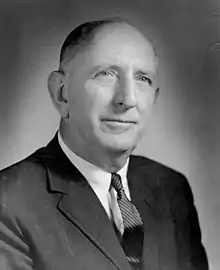 |
Richard Russell Jr. | June 27, 1931 – January 10, 1933 (not candidate for election) |
Democratic | 1930[lower-alpha 36] | |||
| 45 | 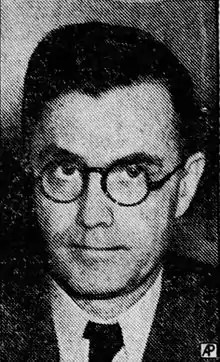 |
Eugene Talmadge | January 10, 1933 – January 12, 1937 (term limited) |
Democratic | 1932 | |||
| 1934 | ||||||||
| 46 |  |
Eurith D. Rivers | January 12, 1937 – January 14, 1941 (term limited) |
Democratic | 1936 | |||
| 1938 | ||||||||
| 67 |  |
Eugene Talmadge | January 14, 1941 – January 12, 1943 (not candidate for election) |
Democratic | 1940 | |||
| 47 | Ellis Arnall | January 12, 1943 – January 14, 1947 (term limited) |
Democratic | 1942[lower-alpha 37] | ||||
| — |  |
Eugene Talmadge | Died before taking office | Democratic | 1946[lower-alpha 38] | Melvin E. Thompson | ||
| — |  |
Herman Talmadge | January 14, 1947 – March 18, 1947 (removed from office) |
Democratic | ||||
| 48 | Melvin E. Thompson | March 18, 1947 – November 17, 1948 (lost election) |
Democratic | Succeeded from Lieutenant Governor |
Vacant | |||
| 49 |  |
Herman Talmadge | November 17, 1948 – January 11, 1955 (term limited) |
Democratic | 1948 (special)[lower-alpha 39] |
Marvin Griffin | ||
| 1950 | ||||||||
| 50 |  |
Marvin Griffin | January 11, 1951 – January 13, 1956 (term limited) |
Democratic | 1954 | Ernest Vandiver | ||
| 51 | Ernest Vandiver | January 13, 1956 – January 15, 1963 (term limited) |
Democratic | 1958 | Garland T. Byrd | |||
| 52 |  |
Carl Sanders | January 15, 1963 – January 11, 1967 (term limited) |
Democratic | 1962 | Peter Zack Geer | ||
| 53 | 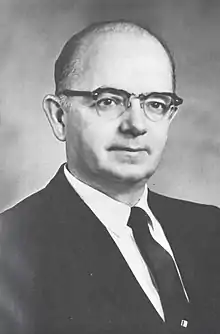 |
Lester Maddox | January 11, 1967 – January 12, 1971 (term limited) |
Democratic | 1966 | George T. Smith | ||
| 54 |  |
Jimmy Carter | January 12, 1971 – January 14, 1975 (term limited) |
Democratic | 1970 | Lester Maddox | ||
| 55 |  |
George Busbee | January 14, 1975 – January 11, 1983 (term limited) |
Democratic | 1974 | Zell Miller | ||
| 1978 | ||||||||
| 56 |  |
Joe Frank Harris | January 11, 1983 – January 14, 1991 (term limited) |
Democratic | 1982 | |||
| 1986 | ||||||||
| 57 | .jpg.webp) |
Zell Miller | January 14, 1991 – January 11, 1999 (term limited) |
Democratic | 1990 | Pierre Howard | ||
| 1994 | ||||||||
| 58 | 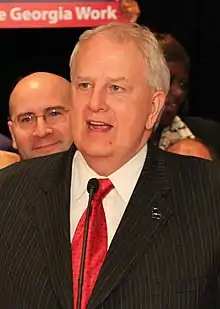 |
Roy Barnes | January 11, 1999 – January 13, 2003 (lost election) |
Democratic | 1998 | Mark Taylor[lower-alpha 40] | ||
| 59 |  |
Sonny Perdue | January 13, 2003 – January 10, 2011 (term limited) |
Republican | 2002 | |||
| 2006 | Casey Cagle | |||||||
 |
Nathan Deal | January 10, 2011 – January 14, 2019 (term limited) |
Republican | 2010 | ||||
| 2014 | ||||||||
| 83 | .jpg.webp) |
Brian Kemp | January 14, 2019 – present[lower-alpha 41] |
Republican | 2018 | Geoff Duncan | ||
Notes
- Data is sourced from the Official and Statistical Register of Georgia,[2] unless supplemental references are required.
- The state says Brian Kemp is the 83rd governor; this number is derived from the Official and Statistical Register of Georgia, last published by the Office of Secretary of State in 1978. It continues the numbering from the colonial governors and omits repeat governors, thus marking Archibald Bulloch as 7th and George Busbee as 77th.[2]
- The office of Lieutenant Governor was created in 1945, first being filled in 1947.
- The revolutionary government did not necessarily follow any schedule or term lengths, and thus the election year is omitted until 1781, when it becomes easier to determine.
- Gwinnett was elected by the council to succeed Bulloch.[3]
- The date given is the capture of Savannah, where the New Georgia Encyclopedia says his last official act as governor was to flee.[4]
- The capture of Savannah threw the government into disarray and exile, and records are scarce as to dates and leadership. William Glascock (elected January 21, 1779)[5] and Seth John Cuthbert (elected July 24, 1779), while often included in lists of governors, are omitted from the official state register, likely because of this reason. A school pamphlet from 1977 notes, "This confusing situation resulted in a number of radical Whigs, mainly from Wilkes County, organizing a second government with George Walton as governor and Glascock as speaker of the assembly. ... As a result of this makeshift election, there were two Whig governments plus the restored loyalist government."[6]
- Howly resigned to be a delegate to the Continental Congress.[7]
- George Wells succeeded Howly, but was killed in a duel on February 16, 1780; he is omitted from nearly every list of governors, including the official register. Stephen Heard then became governor.[8]
- Some sources say Myrick Davies was elected in August 1780 and served until his death;[9] however, he is omitted from the official state register.
- James Jackson was elected in 1788, but declined the position, citing inexperience.[10]
- First term under the 1789 constitution, which lengthened terms to two years.[11]
- Jackson resigned to take an elected seat in the United States Senate.[10]
- Tattnall resigned due to declining health.[12]
- Milledge resigned to take an elected seat in the United States Senate.[13]
- Special election for the remainder of Josiah Tattnall's term[14]
- Mitchell resigned to be agent to the Creek Indians.[15]
- One source states Brown left office on June 25, which could make sense as it would take several days for news of Johnson's appointment to reach Georgia. However, this source has not been corroborated.[16]
- Brown resigned following the defeat of the Confederate States of America.[17]
- At least one source states Johnson left office "five days after" Jenkins took office, which would be December 19.[18] However, more contemporary sources say he left office on December 14.[19]
- Johnson was appointed provisional governor by the Union occupation.[18]
- Jenkins was removed from office by the military because he refused to allow state funds to be used for a racially integrated state constitutional convention; the state was still under military occupation during Reconstruction.[20]
- Provisional governor appointed by General George Meade[21]
- Some sources state Bullock took office on July 21, but more contemporary sources say July 4.[19]
- Some sources state Bullock resigned on October 23, but that is when he secretly submitted his resignation; it did not take effect until October 30.[22]
- Bullock resigned and fled the state to avoid impeachment; he was arrested in 1876 and found not guilty of embezzlement.[22]
- First term under the 1868 constitution, which lengthened terms to four years.[23]
- Special election for the remainder of Rufus Bullock's term[24]
- First term under the 1877 constitution, which shortened terms to two years.[25]
- McDaniel's first term was shortened, so it is not known if he can be considered term limited.
- Special election for the remainder of Alexander Stephens' term[26]
- The start of a gubernatorial term has always been set by the legislature, rather than the constitution; it appears the start of this term changed from the last Saturday in October to the last Saturday in June, lengthening it by eight months.
- Sources are split on whether Smith resigned on November 15 or November 16, with contemporary sources leaning towards November 15.[27]
- Smith resigned to take an elected seat in the United States Senate.[28]
- Special election for the remainder of Hoke Smith's term[29]
- The start of the term changed from the last Saturday in June to the second Tuesday in January, shortening this term by five months.[30]
- First term under the 1941 amendment to the constitution, which lengthened terms to four years.[31]
- Eugene Talmadge was elected to a third term in 1946, but died before taking office. Ellis Arnall, governor at the time, claimed the office, as did Lieutenant Governor Melvin Thompson. The state legislature chose Eugene Talmadge's son, Herman Talmadge, to be governor, but during what came to be called the "Three Governors controversy", the state supreme court declared this unconstitutional and declared Thompson rightful governor, and Talmadge stepped down after 67 days. Talmadge later defeated Thompson in a special election.[32]
- Special election to fill Eugene Talmadge's term[32]
- Represented the Democratic Party
- Kemp's first term expires January 9, 2023.
References
- "CSG Releases 2013 Governor Salaries". The Council of State Governments. June 25, 2013. Archived from the original on October 22, 2014. Retrieved November 23, 2014.
- "Georgia Official and Statistical Register, 1977-1978 - page 1145". Digital Library of Georgia. Archived from the original on January 16, 2019. Retrieved January 15, 2019.
- "Button Gwinnett". National Governors Association. 12 January 2015. Retrieved June 21, 2019.
- "John Houstoun". New Georgia Encyclopedia. Retrieved January 15, 2019.
- Fleming, Berry (2009). Autobiography of a Colony: The First Half-Century of Augusta, Georgia. University of Georgia Press. p. 127. ISBN 978-0-8203-3442-4. Retrieved January 15, 2019.
- "Political Changes in Georgia 1775-1787" (PDF). Georgia Department of Education. Retrieved January 15, 2019.
- "Richard Howley". National Governors Association. 12 January 2015. Retrieved June 21, 2019.
- Cashin, Edward J. (1974). ""The Famous Colonel Wells:" Factionalism in Revolutionary Georgia". The Georgia Historical Quarterly. 58: 137–156. JSTOR 40579633.
- "Stephen Heard". New Georgia Encyclopedia. Retrieved January 15, 2019.
- "James Jackson". National Governors Association. 12 January 2015. Retrieved July 10, 2019.
- 1789 Const. art. 2, § 1
- "Josiah Tattnall". National Governors Association. 12 January 2015. Retrieved June 21, 2019.
- "John Milledge". National Governors Association. 12 January 2015. Retrieved June 21, 2019.
- "Georgia 1802 Governor, Special". Tufts University. Archived from the original on September 13, 2016. Retrieved August 28, 2016.
- "David Brydie Mitchell". National Governors Association. 12 January 2015. Retrieved June 21, 2019.
- Otto, John Henry (2004). Memoirs of a Dutch Mudsill. Kent State University Press. ISBN 978-0-87338-799-6.
- "Joseph Emerson Brown". National Governors Association. 12 January 2015. Retrieved June 21, 2019.
- "James Johnson". National Governors Association. 12 January 2015. Retrieved July 10, 2019.
- John Hanson Thomas McPherson (1896). The Government of the People of the State of Georgia. Eldredge & Brother. pp. 184–186. Retrieved August 27, 2016.
- "Charles Jones Jenkins (1805-1883)". New Georgia Encyclopedia. Retrieved June 21, 2019.
- "Thomas Ruger (1833-1907)". New Georgia Encyclopedia. Retrieved June 21, 2019.
- "This Day in Georgia History - October 23, 1871: Rufus Bullock Resigned". Georgia Library Learning Online. Retrieved August 27, 2016.
- 1868 Const. art. IV, § 1
- "James Milton Smith". National Governors Association. 12 January 2015. Retrieved June 21, 2019.
- 1877 Const. art. 5, § 1 par. 2
- "Henry Dickerson McDaniel". National Governors Association. 12 January 2015. Retrieved June 21, 2019.
- Congress, United States. (1919). Official Congressional Directory. U.S. Government Printing Office. p. 17. Retrieved August 27, 2016.
- "Hoke Smith". National Governors Association. 12 January 2015. Retrieved June 21, 2019.
- "Joseph Mackey Brown". National Governors Association. 12 January 2015. Retrieved June 21, 2019.
- "Richard Brevard Russell". National Governors Association. 12 January 2015. Retrieved July 10, 2019.
- "Georgia's Official Register, 1939-1941-1943" (PDF). Georgia Department of Archives and History. p. 6. Retrieved June 23, 2019.
- "Three Governors Controversy". New Georgia Encyclopedia. Retrieved June 21, 2019.
This article is issued from Wikipedia. The text is licensed under Creative Commons - Attribution - Sharealike. Additional terms may apply for the media files.